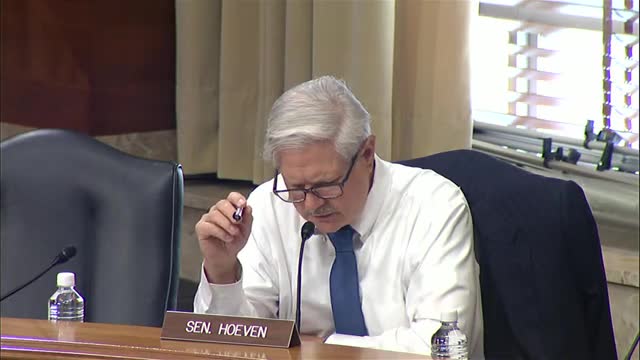Senators clash over energy policy and drilling permits
July 10, 2024 | Energy and Natural Resources: Senate Committee, Standing Committees - House & Senate, Congressional Hearings Compilation

This article was created by AI summarizing key points discussed. AI makes mistakes, so for full details and context, please refer to the video of the full meeting. Please report any errors so we can fix them. Report an error »

During a recent government meeting, significant discussions centered on energy policy, land management, and the implications of federal regulations on oil and gas production, particularly in North Dakota.
Senator John Hoeven raised concerns about the potential impact of a resource management plan that could restrict leasing of oil, gas, and coal acreage. He emphasized the complex ownership structure in North Dakota, where federal, state, and private entities hold various rights to land and minerals. Hoeven argued that limiting access to these resources could disenfranchise both the state and private landowners, urging collaboration on the management plan to ensure fair access.
The conversation also touched on the Biden administration's drilling permit statistics. Hoeven noted discrepancies in reported numbers, highlighting a decrease in permits approved compared to previous administrations. He expressed the need for accurate data to support North Dakota's significant oil production, which he argued is crucial for reducing gasoline prices and enhancing national energy security.
Another critical topic was the delay in finalizing offshore carbon capture and storage regulations, mandated by the Infrastructure Investment Jobs Act. Senator Hoeven criticized the administration for missing deadlines and emphasized the importance of carbon sequestration in meeting climate goals. He pressed for a commitment to publish a proposed rule by the end of the year, indicating that the current lack of action undermines efforts to address climate change effectively.
The meeting concluded with discussions on royalty rates for oil and gas leases, with concerns raised about a decision to increase these rates, which some believe could hinder domestic production and energy security. The senators underscored the need for policies that balance environmental goals with the imperative of maintaining robust energy production in the United States.
Overall, the meeting highlighted ongoing tensions between energy policy, environmental regulations, and the economic realities faced by states heavily reliant on fossil fuel production.
Senator John Hoeven raised concerns about the potential impact of a resource management plan that could restrict leasing of oil, gas, and coal acreage. He emphasized the complex ownership structure in North Dakota, where federal, state, and private entities hold various rights to land and minerals. Hoeven argued that limiting access to these resources could disenfranchise both the state and private landowners, urging collaboration on the management plan to ensure fair access.
The conversation also touched on the Biden administration's drilling permit statistics. Hoeven noted discrepancies in reported numbers, highlighting a decrease in permits approved compared to previous administrations. He expressed the need for accurate data to support North Dakota's significant oil production, which he argued is crucial for reducing gasoline prices and enhancing national energy security.
Another critical topic was the delay in finalizing offshore carbon capture and storage regulations, mandated by the Infrastructure Investment Jobs Act. Senator Hoeven criticized the administration for missing deadlines and emphasized the importance of carbon sequestration in meeting climate goals. He pressed for a commitment to publish a proposed rule by the end of the year, indicating that the current lack of action undermines efforts to address climate change effectively.
The meeting concluded with discussions on royalty rates for oil and gas leases, with concerns raised about a decision to increase these rates, which some believe could hinder domestic production and energy security. The senators underscored the need for policies that balance environmental goals with the imperative of maintaining robust energy production in the United States.
Overall, the meeting highlighted ongoing tensions between energy policy, environmental regulations, and the economic realities faced by states heavily reliant on fossil fuel production.
View full meeting
This article is based on a recent meeting—watch the full video and explore the complete transcript for deeper insights into the discussion.
View full meeting